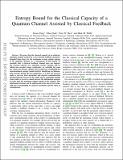| dc.contributor.author | Shor, Peter Williston | |
| dc.date.accessioned | 2020-08-19T12:28:22Z | |
| dc.date.available | 2020-08-19T12:28:22Z | |
| dc.date.issued | 2019-07 | |
| dc.identifier.uri | https://hdl.handle.net/1721.1/126673 | |
| dc.description.abstract | We prove that the classical capacity of an arbitrary quantum channel assisted by a free classical feedback channel is bounded from above by the maximum average output entropy of the quantum channel. As a consequence of this bound, we conclude that a classical feedback channel does not improve the classical capacity of a quantum erasure channel, and by taking into account energy constraints, we conclude the same for a pure-loss bosonic channel. The method for establishing the aforementioned entropy bound involves identifying an information measure having two key properties: 1) it does not increase under a one-way local operations and classical communication channel from the receiver to the sender and 2) a quantum channel from sender to receiver cannot increase the information measure by more than the maximum output entropy of the channel. This information measure can be understood as the sum of two terms, with one corresponding to classical correlation and the other to entanglement. | en_US |
| dc.description.sponsorship | National Science Foundation (U.S.) (Grant CCF-1525130) | en_US |
| dc.description.sponsorship | National Science Foundation (U.S.). Science Technology Center for Science of Information (Grant CCF0-939370) | en_US |
| dc.language.iso | en | |
| dc.publisher | IEEE | en_US |
| dc.relation.isversionof | 10.1109/ISIT.2019.8849604 | en_US |
| dc.rights | Creative Commons Attribution-Noncommercial-Share Alike | en_US |
| dc.rights.uri | http://creativecommons.org/licenses/by-nc-sa/4.0/ | en_US |
| dc.source | arXiv | en_US |
| dc.title | Entropy Bound for the Classical Capacity of a Quantum Channel Assisted by Classical Feedback | en_US |
| dc.type | Article | en_US |
| dc.identifier.citation | Ding, Dawei et al. “Entropy Bound for the Classical Capacity of a Quantum Channel Assisted by Classical Feedback.” Paper presented at the 2019 IEEE International Symposium on Information Theory (ISIT), Paris, France, 7-12 July 2019, IEEE © 2019 The Author(s) | en_US |
| dc.contributor.department | Massachusetts Institute of Technology. Center for Theoretical Physics | en_US |
| dc.contributor.department | Massachusetts Institute of Technology. Department of Mathematics | en_US |
| dc.relation.journal | 2019 IEEE International Symposium on Information Theory (ISIT) | en_US |
| dc.eprint.version | Author's final manuscript | en_US |
| dc.type.uri | http://purl.org/eprint/type/ConferencePaper | en_US |
| eprint.status | http://purl.org/eprint/status/NonPeerReviewed | en_US |
| dc.date.updated | 2019-11-20T13:59:14Z | |
| dspace.date.submission | 2019-11-20T13:59:18Z | |
| mit.journal.volume | 2019 | en_US |
| mit.metadata.status | Complete | |
